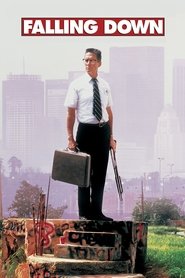Becoming violent when being refused breakfast is something of an American tradition. In 1856, when California representative Philemon Thomas Herbert was refused breakfast service at Willard's Hotel in Washington D. C. because it was too late in the morning, Herbert shot the waiter. Even more American, perhaps, he was later acquitted by a sympathetic jury.
A film doesn't have to be great -- or even very good -- to be found important as a kind of cultural landmark. All it has to do is strike a nerve, and "Falling Down," director Joel Schumacher's hysterical movie editorial about a man stretched to the breaking point by the traumas of everyday life, certainly digs its instruments into our most sensitive social fibers.
— Hal Hinson (Washington Post)
Curiously enough, Hal Hinson (writing in early 1993), suggests that the movie was already "behind the cultural curve":
His character's lawlessness is founded on a combination of desperation and powerlessness. And while the forces of despair are still at work, that dead-end feeling of utter hopelessness appears, at least for the present, to have eased. While Douglas's Everyman is falling down, the country is getting up.
Falling Down [is] a version of Do the Right Thing in reverse about a white-collar white guy who’s Mad As Hell and taking it out on pre-millennial, multicultural Los Angeles.
— Adam Nayman (The Ringer)
Foster’s journey, along with his life, ends at the coast, where the Pacific represents the triumphal trophy of the American continental frontier, and the end of Foster’s excruciating expedition. The twist is that Los Angeles was built not only by westward migration but also by northward and eastward migration. And the Pacific shore where Foster’s journey culminates has long been a pathway for many newcomers who have revitalized the city’s landscape — including, perhaps, the Korean storeowner who so annoyed him early on.
— Carl Abbott (Los Angeles Review of Books)

